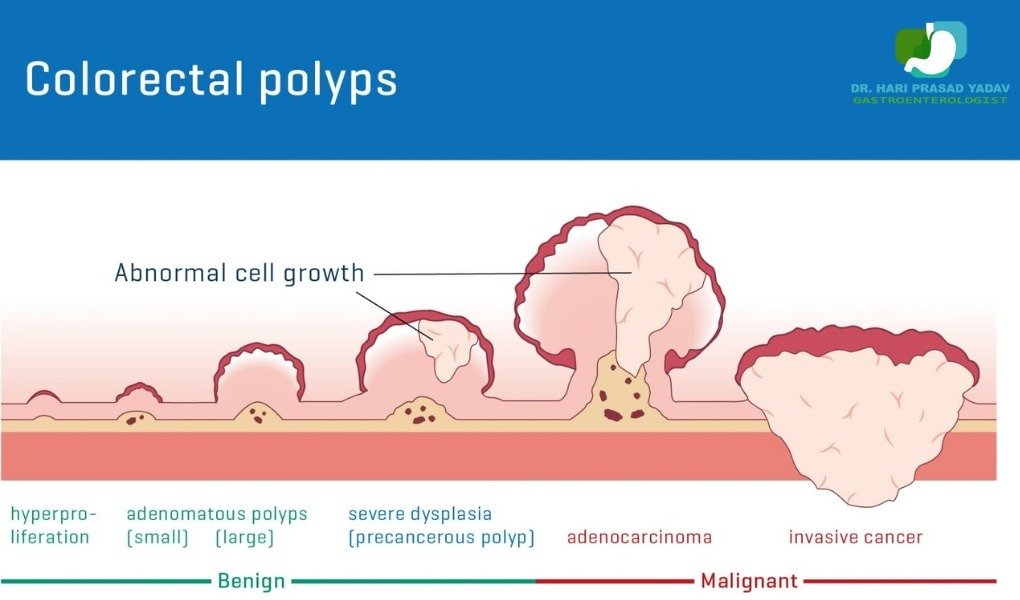All About Colorectal Polyps: What You Should Know

Your overall well-being and quality of life are significantly influenced by your colorectal health. One common concern in this area is colorectal polyps. These abnormal growths can form on the lining of the colon or rectum. The management and prognosis of colorectal polyps depend on various factors, including the type, size, location, number, family history, pathology, age at detection, and more. While most polyps are benign, some can potentially develop into cancer over time. Therefore, For effective management, seeking colorectal polyps treatment in Indore is crucial. Early detection and appropriate treatment by specialists can help prevent complications and ensure your long-term health.
Dr. Hari Prasad Yadav, with 23 years of experience in gastrointestinal health, is a leading expert in Indore, specializing in the detection and treatment of colorectal polyps.
An Overview of Colorectal Polyps
Colorectal polyps are growths that occur on the inner lining of the colon (large intestine) or rectum. They can vary in size, from tiny, nearly invisible growths to larger, more noticeable ones. Most polyps are benign, meaning they do not pose an immediate threat to health. However, some polyps can develop into colorectal cancer if left untreated.
Causes and Risk Factors of Colorectal Polyps
The exact cause of colorectal polyps is not fully understood, but several risk factors can increase the likelihood of developing them. These include:
Age
The risk of developing polyps increases with age, particularly after the age of 50.
Family History
Individuals with a family history of colorectal polyps or colorectal cancer are at higher risk.
Inflammatory Bowel Diseases
Conditions like Crohn's disease and ulcerative colitis increase the risk of developing certain types of polyps.
Diet
Diets high in red meat, low in fiber, and lacking in fruits and vegetables are associated with a higher risk of polyp formation.
Lifestyle Factors
Smoking and excessive alcohol consumption have been linked to an increased risk of colorectal polyps.
Obesity
Being overweight or obese is a known risk factor for polyp development.
Types of Colorectal Polyps
Adenomatous Polyps
These are the most common type and can potentially develop into cancer.
Hyperplastic Polyps
Usually benign and not considered precancerous.
Inflammatory Polyps
Often associated with inflammatory bowel diseases.
Sessile Serrated Polyps
These have a higher risk of becoming cancerous.
Villous Adenoma
These polyps have a higher likelihood of becoming malignant.
Signs and Symptoms of Colorectal Polyps
Blood in the Stool
Changes in Bowel Movements
Persistent constipation or diarrhea lasting longer than a week.
Unexplained Weight Loss or Iron Deficiency Anemia
Abdominal Pain
Abdominal pain is Rare, but possible.
Rectal Bleeding
Visible on toilet paper or underwear.
Detection and Diagnosis of Colorectal Polyps
Since colorectal polyps often do not cause noticeable symptoms in their early stages, regular screenings are essential, especially for individuals over the age of 50 or those with risk factors. Dr. Hari Prasad Yadav, with his extensive experience in gastrointestinal health in Indore, utilizes several methods to detect colon polyps, including:
Colonoscopy
The most comprehensive method for detecting polyps.
Sigmoidoscopy
Focuses on the lower part of the colon.
Virtual Colonoscopy
A less invasive imaging technique using CT scans.
Stool Tests
These can indicate the presence of blood or other abnormalities.
Expert Care in Indore
For expert care in colorectal health, including the detection and management of colorectal polyps, consult Dr. Hari Prasad Yadav in Indore. With over 23 years of experience, Dr. Yadav provides comprehensive and personalized care to ensure the best outcomes for his patients. Whether you are in Vijay Nagar, Saket Nagar, or any other part of Indore, Dr. Hari Prasad Yadav is your trusted specialist for gastrointestinal health.
